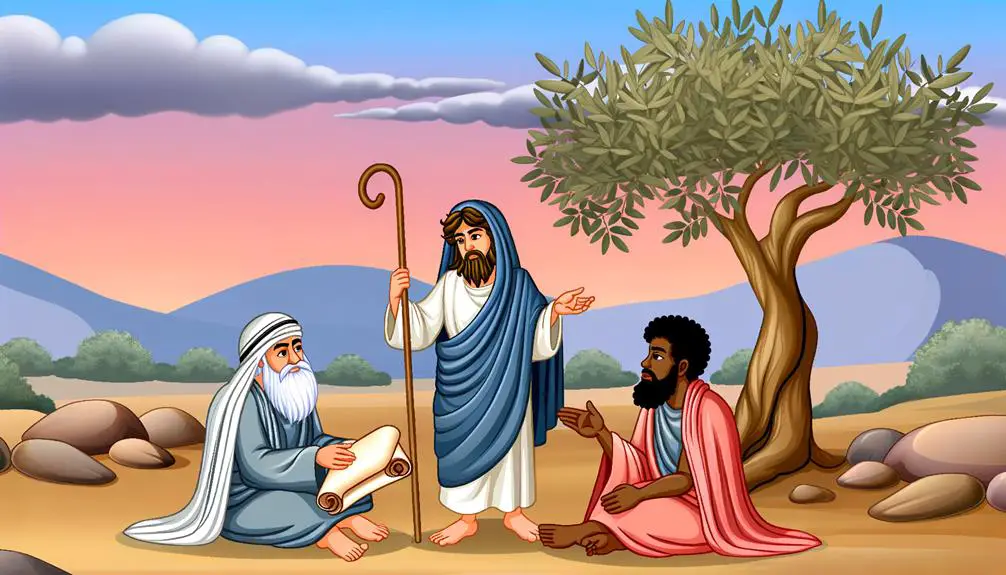Gain insights into the Bible's firm stance against divination, exploring its profound implications on faith and morality.

Divining in the Bible
In your exploration of divining in the Bible, you'll discover that it unequivocally condemns such practices. Divination is deemed an abomination, contrasting sharply with the faith's guided moral compass. The scriptures frequently distinguish the actions of the Israelites from those of neighboring pagan cultures, emphasizing a prohibition among the faithful. Though divination was common in various ancient societies, the Biblical narrative promotes divine guidance through prophets, dreams, and symbols rather than through omens or sorcery. This stark opposition invites a deeper appreciation of how these ancient texts influence contemporary views on spirituality and ethics. Delving further might reveal how these insights resonate today.
Key Takeaways
- The Bible condemns divination as an abomination and prohibits its practice among the faithful.
- Divination contrasts with approved forms of divine guidance like prophecy and dream interpretation.
- Biblical prophecy and dream interpretation serve as legitimate channels for understanding God's will.
- Prophets in the Bible, unlike diviners, receive and proclaim messages directly from God to guide and correct the people.
- Historical and cultural contexts show that divination was common in surrounding pagan societies but rejected by the Israelites.
Biblical Condemnation of Divination

The Bible explicitly condemns divination, labeling it as an abomination that is forbidden among the faithful. This stern prohibition stems from the broader biblical worldview that emphasizes reliance on God's wisdom rather than seeking knowledge through occult or mystical means. You'll find that sorcery condemnation is woven throughout the scriptures, contrasting the practices of the Israelites with those of surrounding pagan cultures.
In Deuteronomy 18:9-12, as you enter the land God has given you, you're warned not to imitate the detestable ways of the nations living there. No one among you is to practice divination, sorcery, interpret omens, engage in witchcraft, or cast spells, or function as mediums or psychics, or call forth the spirits of the dead. This passage not only condemns these practices but also categorizes them under pagan practices, which are distinctly set apart from the worship and practices God ordains.
This strong stance underscores a fundamental theological point: seeking guidance or attempting to control one's future through divination distorts and undermines the sovereign role of God. It's considered not just erroneous but inherently rebellious, aligning oneself with systems and powers that oppose the divine order established by God.
Forms of Divine Guidance
As you explore the Bible's depiction of divine guidance, you'll encounter various methods through which God communicates with humanity. Biblical prophecy provides not only forewarnings but also deep insights into divine will, while dream interpretations serve as a conduit for understanding messages that transcend ordinary consciousness. These forms underscore a complex relationship between the divine and the human, inviting a reflective analysis of their significance and applications.
Biblical Prophecy Insights
Biblical prophecy offers profound insights into divine guidance, revealing how God communicated His will to humanity. As you explore these ancient texts, you'll notice that prophetic accuracy and interpretation methods are critical to understanding these divine messages. Here are some key aspects to take into account:
- Historical Context – Analyzing the period in which a prophecy was given enhances your understanding of its implications.
- Symbolic Language – Prophets often used symbols; recognizing these can reveal deeper meanings.
- Cultural Relevance – Understanding the cultural backdrop helps to interpret prophetic messages accurately.
- Scholarly Interpretation – Engaging with reputable biblical scholars can provide clarity and avoid common misinterpretations.
Dream Interpretations Explained
Interpreting dreams, another form of divine guidance, reveals God's messages delivered through visions during sleep. Throughout the Bible, dream interpretations play a pivotal role, often involving symbolic meanings that require deep psychological analysis to understand. You'll find that dreams aren't just random night visions; they're imbued with spiritual insights aimed to guide, warn, or inspire.
Symbolic Element |
Possible Interpretation |
|---|---|
Water |
Life changes, spirituality |
Fire |
Purification, warnings |
Serpent |
Temptation, wisdom |
The Role of Prophets

As you explore the role of prophets in biblical texts, you'll find they are not merely historical figures but are pivotal in defining the dynamics of divine communication. Their interactions with God provide a foundational model for understanding divine messages and their transmission. The impact of these prophets on believers, shaping both spiritual and societal norms, cannot be understated.
Prophetic Roles Defined
What roles did prophets play in the biblical narrative, and how did their divine messages shape the course of history? As you explore this question, it's important to ponder the unique position prophets held. They weren't merely foretellers of future events; their roles were multifaceted and deeply interwoven with the spiritual and societal developments of their times.
Prophets served to:
- Guide: Offering divine direction to rulers and nations.
- Warn: Foretelling the consequences of societal sins.
- Comfort: Providing reassurance during times of distress.
- Challenge: Confronting complacency and injustice.
Their prophetic accuracy and the interpretative challenges their messages presented were pivotal in shaping the religious and moral landscapes, influencing not just immediate actions but also long-term cultural shifts.
Communication With God
Prophets often served as the essential link between humanity and the divine, channeling God's messages to guide, warn, comfort, and challenge His people. You'll find that their role was pivotal in fostering not just belief but deep spiritual discernment. Through the prophets, individuals learned the nuances of interpreting divine signs and the efficacy of their prayers.
To better understand this, consider the following table outlining key aspects of prophetic communication:
Prophet |
Key Message |
Impact on Spiritual Discernment |
|---|---|---|
Isaiah |
Trust in God |
Enhanced understanding of divine will |
Jeremiah |
Repentance |
Fostered introspection and recognition of sin |
Ezekiel |
Divine Sovereignty |
Strengthened reliance on God's control |
Daniel |
God's Kingdom Endures |
Promoted hope and perseverance |
Hosea |
Unfailing Love |
Deepened emotional and spiritual relationship with God |
Through these messages, you're invited into a deeper, more effective engagement with the spiritual domain.
Impact on Believers
Guiding believers through times of uncertainty and change, the prophets profoundly shaped their faith and understanding of divine purpose. As you reflect on their influence, you'll find that these spiritual leaders were pivotal in addressing ethical debates and resolving spiritual dilemmas. They didn't just predict future events; they also offered moral guidance, helping you to discern right from wrong in complex situations.
To understand their impact more deeply, consider these roles they played:
- Advisers on moral and ethical issues.
- Mediators between God and humanity.
- Interpreters of divine laws and commandments.
- Comforters in times of distress and confusion.
In these capacities, prophets helped mold the spiritual landscape, ensuring that your journey was aligned with divine will, thereby enriching your relationship with the divine.
Historical Context of Divination

When delving into the historical context of divination, it is important to acknowledge its profound integration into ancient practices and beliefs across various civilizations. You'll find that divination wasn't just a cultural artifact; it was woven deeply into the societal and religious fabrics of numerous cultures. Ancient practices of divination, whether through the casting of lots, interpreting omens, or consulting oracles, served as vital conduits for making decisions and understanding the divine will.
The cultural influences on divination methods were vast and varied. In ancient Mesopotamia, for instance, diviners read the patterns in the liver of sacrificed animals—a practice known as hepatoscopy. Meanwhile, in the ancient Mediterranean, particularly within the Greek and Roman societies, oracles such as those at Delphi played pivotal roles in guiding rulers and common folk alike. These practices underscored a universal quest to seek guidance from a higher power, reflecting a shared human inclination toward seeking certainty in an uncertain world.
This exploration of divination's roots shows that it's not just a relic of the past but a reflection of the enduring human desire to connect with the divine, understand the cosmos, and seek answers beyond the reach of mundane reality.
Modern Perspectives on Divination
While ancient practices of divination were deeply intertwined with the spiritual and decision-making processes of past civilizations, today's views on these methods have evolved to reflect broader spiritual and psychological understandings. As you explore further into modern perspectives on divination, you'll find that cultural shifts and ethical debates have greatly shaped contemporary attitudes towards these ancient practices.
Here are four key areas where these influences are most evident:
- Academic Scrutiny: Divination is now often studied under the lens of anthropology and psychology, dissecting its role in human behavior and societal structures.
- Cultural Integration: In many societies, traditional divinatory practices have merged with new age spirituality, creating hybrid forms of spiritual expression.
- Ethical Concerns: There's an ongoing debate around the morality of using divination, especially regarding its authenticity and the potential for exploitation.
- Technological Adaptation: The digital age has transformed divination practices, with online tarot readings and astrological apps broadening access and altering engagement.
These points illustrate how divination is not just a relic of the past but a living practice that continues to evolve and resonate within various modern contexts. As you reflect on these shifts, it's clear that the journey of divination through the ages is as much about human nature as it is about spirituality.
Implications for Contemporary Faith

In contemporary faith contexts, divination's role has sparked significant discourse regarding its integration and theological implications. You may find yourself questioning how such ancient practices can or should intersect with modern faith practices. This intersection is not merely a theological query but a practical challenge, facing both scrutiny and reinterpretation in light of modern skepticism.
Divination in the Bible, as you've read, is often met with ambivalence, which may mirror your own feelings towards these practices. The scriptures provide instances that both forbid and depict divination, adding layers to your understanding. How, then, are you to reconcile these with your contemporary faith experiences?
The key lies in discernment and the adaptation of ancient wisdom to current contexts. As you navigate through your faith journey, integrating such practices requires a nuanced approach. Consider how the spiritual sensitivity and the seeking of divine guidance, as reflected in biblical divination, can inform your personal faith practices without compromising the core tenets of your beliefs.
Thus, as you engage with these ancient texts and contexts, allow them to challenge and enrich your faith, rather than distancing yourself due to preconceived notions. Let historical depth inform your spirituality, bridging the gap between ancient divination and contemporary faith expressions.
Frequently Asked Questions
How Is Prayer Different From Divination in Biblical Terms?
In exploring spiritual practices, you'll find prayer serves as a communication with the divine, seeking guidance or assistance, whereas divination means using tools or rituals to predict events or reveal hidden knowledge.
Did Any Biblical Heroes Ever Practice Divination?
You're delving into whether biblical heroes engaged in practices akin to divination. Remarkably, Saul's consultation with the Witch of Endor and Balaam's prophecy could be interpreted as such under certain scholarly lenses.
Are Dreams Considered a Form of Divination in the Bible?
In the Bible, dreams often aren't just random; they can carry prophetic visions. Dream interpretation was considered a divine communication, guiding figures with insights that shaped their decisions and foretold future events.
What Was the Urim and Thummim Used for in the Bible?
Why wonder about ancient practices? The Urim and Thummim, integral to priestly attire, were decision-making tools, guiding the Israelites through divine judgment. Their use reflects a profound, reverential approach to governance and spiritual inquiry.
Can Astrology Be Compatible With Biblical Teachings?
Astrological origins may seem incompatible with biblical teachings due to moral implications. You'll find that scripture generally advises against practices rooted in astrology, emphasizing reliance on divine guidance rather than celestial influences.



Sign up